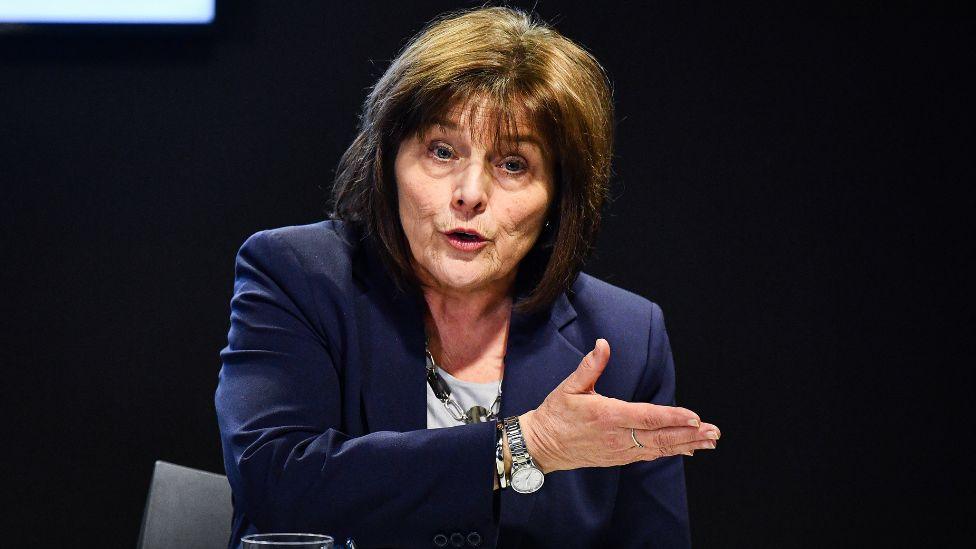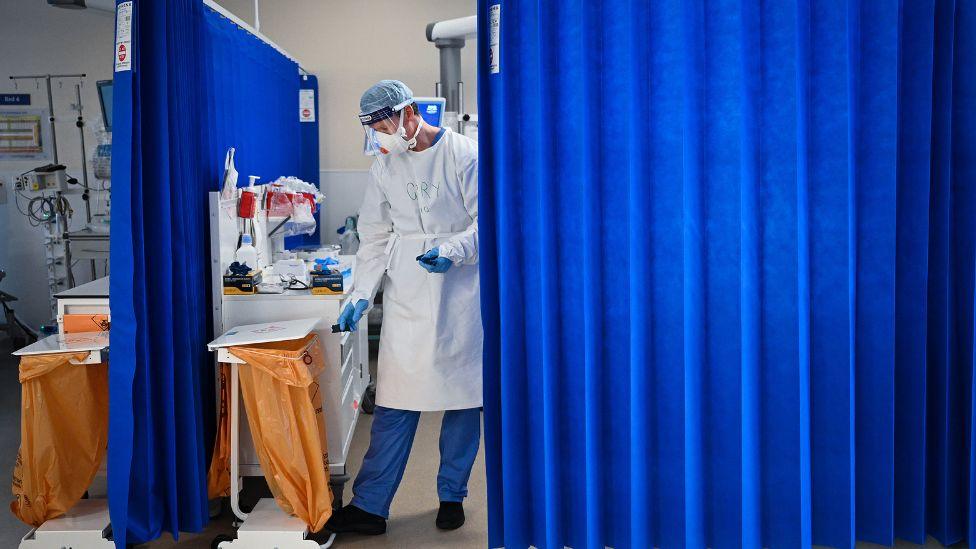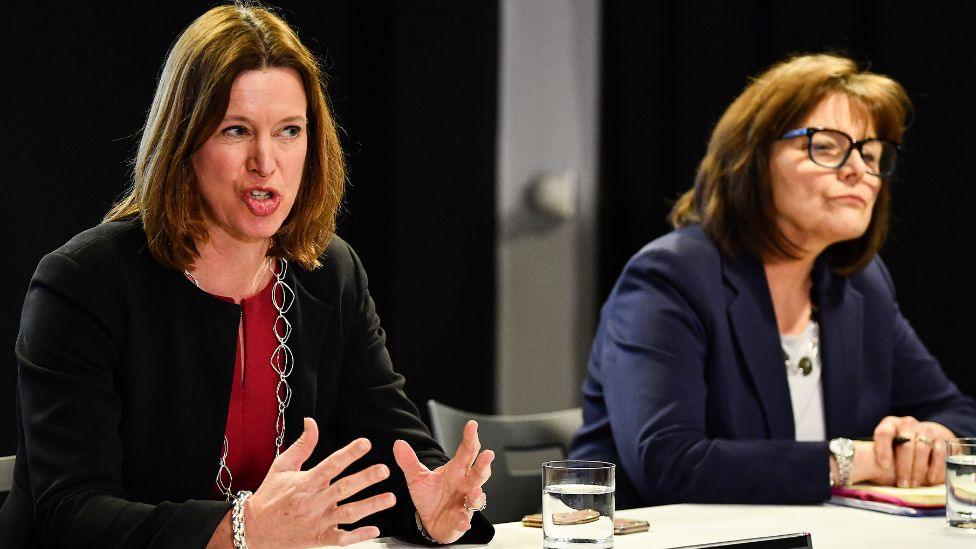No plan could have prepared Scotland for Covid - Jeane Freeman
- Published

Former Scottish health secretary Jeane Freeman has given evidence to the UK Covid inquiry
There was no plan which could have adequately prepared Scotland for the coronavirus pandemic, former health secretary Jeane Freeman has said.
She told the UK Covid Inquiry that health infrastructure was not equipped to handle the crisis and that PPE supplies came close to running out.
The ex-minister also said some guidance on flu outbreaks had not been acted upon by the time the pandemic began.
The inquiry will hear from former first minister Nicola Sturgeon on Thursday.
Counsel to the inquiry, Kate Blackwell KC, pointed to a 2021 Audit Scotland report that found the government was inadequately prepared for the crisis and had failed to implemented recommendations from three pandemic planning exercises in 2015, 2016 and 2018.
Ms Freeman, who was the Scottish health secretary from 2018 to 2021, said: "There were certainly areas where Scotland could have been better prepared in terms of the underlying structure and delivery of all those recommendations.
"But Scotland, like other countries throughout the world, was dealing with a virus which was unknown and new.
"So in that sense, I don't believe there is a plan that would have been possible that would have been able, in and of itself, to cope with Covid-19."

The UK Covid inquiry is currently examining preparedness for the pandemic
The Audit Scotland report found that Scotland's PPE stockpile was not sufficient to meet the demands of the NHS in early 2020.
The inquiry heard that the issue of stockpiling, providing and fit testing PPE had been raised in three consecutive exercises, but that the Scottish government had not acted on recommendations.
Ms Freeman – whose video-link testimony was repeatedly interrupted due to a poor internet connection – said the country had not run out of PPE, but there had "clearly" been persistent issues with distributing equipment to frontline staff.
"There was sufficient PPE at the start of the pandemic," she told the inquiry.
"Obviously there were serious challenges throughout that and although it's fair to say we came close on some occasions, we did not run out of PPE in Scotland."
Ms Freeman said there was no "specific plan" to respond to any other pathogen than influenza in Scotland.
"There was certainly an understanding of different pathogens, but Covid-19 was a novel virus so its exact characteristics and how it would perform and transmit was unknown internationally and so information and clinical assessment of that was being updated regularly," she told the inquiry.
Ms Freeman said that Covid-19 has exacerbated existing operational issues in Scottish NHS - but added the health service performance was also affected by UK government spending decisions.
She said Downing Street's austerity policies had a direct impact on the Scottish government, which is unable to borrow money or overspend its budget.
"Notwithstanding that the health budget and the budget for social care had increased year on year but not necessarily increased sufficiently to meet with additional demands but also with other cost pressures around pharmacy, inflation and so on."

The inquiry is also due to hear from Scotland's former chief medical officer, Dr Catherine Calderwood
It came after a senior civil servant said planning for a potential no-deal Brexit had hampered Scotland's preparation for a pandemic.
The inquiry heard that work to enact recommendations made as a result of national resilience exercises, Silver Swan in 2015 and Cygnus in 2016, remained incomplete.
Gillian Russell, the Scottish government's director for safer communities from 2015 to 2020 and the current health workforce director, said resilience work was put on hold in October 2018 for Operation Yellowhammer – the UK government code name for preparations to deal with a chaotic no-deal exit from the EU.
She described the Brexit planning as "very, very significantly challenging" for civil servants.
Ms Russell told the inquiry: "A decision was taken that priority should be given to working through how we would mitigate the very significant risks that immediately crystallised on a no-deal Brexit."
She said some work, including around communication strategies and resilience partnerships was completed on schedule, but that much of it was side-tracked due to Brexit planning.
"That took up a huge amount of strategic capacity across many parts of Scottish government, including the resilience co-ordination of a lot of that work," the civil servant said.
The inquiry also heard that the Scottish government Pandemic Flu Preparedness Board, set up in 2017, had met every two months until November 2018.
However, meetings became "much more sporadic" due to Yellowhammer, Ms Russell said. The board did not meet between November 2018 and June 2019, with only one further meeting taking place before the Covid crisis hit the UK in early 2020.
On Tuesday, former UK health secretary Matt Hancock told the inquiry that medicines for intensive care were "within hours" of running out at the peak of the pandemic - but said the only reason they did not run out was because of work done in 2019 in preparation for a no-deal Brexit.
Mr Hancock said civil service staff were moved off pandemic preparedness and onto Brexit but insisted, as a result, they "we were better prepared in terms of supply chains".
He added: "Who knows the overall impact and which of those balances in the scales is greater? I'm afraid it's impossible to know."
UK Covid inquiry
The inquiry was also scheduled to hear from Dr Catherine Calderwood, the country's former chief medical officer, on Wednesday.
But Dr Calderwood, who quit after breaking her own Covid lockdown rules, will now give evidence on another day.
The inquiry declined to provide an explanation for the late rearrangement but its agenda says that all timings for hearings are provisional and subject to change.
Nicola Sturgeon and John Swinney are expected to appear in hearings on Thursday.
The inquiry, led by Baroness Heather Hallett, is investigating the UK's response to the pandemic.
It will also look into the impact of the crisis and the lessons that can be learned for future virus outbreaks, with public hearings expected to continue until 2026.
A separate Scottish inquiry was delayed after its original chairwoman resigned for personal reasons and four members of the inquiry's legal team stood down.
The first module of the inquiry, which is set to run until mid-July, is looking at the UK's preparedness for pandemics in the time before Covid struck.